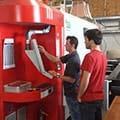A Prevalent Problem
“I don’t want to get my personality out of a pill bottle!” the man snapped when his friend at work recommended seeing a doctor for a possible prescription for his depression.
“All I’m saying is that it really helped me with mine,” his friend said calmly.
“Wait, you are depressed? And you take drugs for it?” the man asked, surprised.
“Yes, I’ve suffered from depression, so my doctor prescribed a pill that I take every morning that has helped even things out,” the friend replied. “I wouldn’t say that it’s changed my personality, only that things no longer seem so overwhelming as they used to.”
The man looked uncertain, but said, “I guess I could talk to my doctor at my next visit, but I’m still not sure about getting treated for it.”
“That’s all I’m asking,” said the friend. “In the meantime, I’m always here for you to vent to, and I’m sure there are others you could talk to among your family and friends as well. Plus, our benefits package covers visits to a counselor, so you might want to investigate that.”
“Thanks,” the man said as he went back to work. “I guess it couldn’t hurt to see what options are available.”
Upwards of 20% of all Americans will develop depression at some point in their lives, and for many it will become disabling to the point of creating habits such as excessive lateness, absenteeism, or substance abuse. Many more encounter stress and anxiety at different times. Just as all human beings suffer physical illness to some degree, all have mental ailments as well. In the past, the term “metal illness” held a stigma of shame, but as people have become more educated about it, society is now recognizing that not only is it common, but those who suffer from it shouldn’t be considered bad or weak, any more than a person with a common cold would be.
The Wise Shop Manager’s Approach
Dealing with a depressed worker in a metal fabrication shop requires a thoughtful and empathetic approach by a foreman, manager, or owner. Mental health is an important aspect of overall well-being, and it’s crucial to create a supportive environment, not only for the sake of the individual, but also to protect the investment that the shop has made in hiring and training them.
Some approaches that can be taken include:
- Learn about depression. The more that you as a manager understand it, the better you will be able to directly deal with workers who might suffer from it (possibly including yourself).
- Keep communication open. Let your worker know that you are available to talk. Let them see that you care about their well-being by being approachable and non-judgmental. Create a safe space for the employee to share their feelings without fear of reprisal. When an employee does confide in you, listen attentively and without interruption. Show empathy and understanding. Validate their feelings without trying to immediately solve the problem. (Remember that sometimes people just need someone to listen to them.)
- Encourage professional help. A mental health professional, such as a therapist or counselor, can likely provide the necessary support and guidance that your worker needs. If they are open to it, help them find resources such as employee assistance programs (EAPs) that could provide confidential counseling and support services. Also check to see if mental health services are covered by your company’s benefits.
- Consider offering flexible work arrangements. It may not be practical in a fab shop, but if you are able to provide a later shift for an employee that is consistently coming in late, it might help. Depression can lead to sleep problems, which could be the root cause of the tardiness.
- Regularly check in with the employee to see how they are doing. This shows that you genuinely care about their well-being and creates an ongoing dialogue. Note: Be sure to respect the employee’s privacy. While it’s important to offer support, avoid pressuring them to disclose more than they are comfortable sharing.
- Create a supportive workplace culture. Fostering a culture that values the well-being of employees will go a long way towards having content workers. This includes promoting work-life balance, recognizing achievements, and providing opportunities for professional development.
- Educate the team about mental health and well-being. This can help reduce stigma and create a more supportive workplace culture. Be sure to train supervisors and team members alike to recognize signs of mental health issues and know how to respond appropriately.
- Follow company policies. It is critical that you follow your business’s policies as well as all legal regulations regarding mental health and workplace accommodations. When in doubt, look it up, and don’t go beyond what is allowed.
Remember that everyone is unique, and your approach to the worker may need to be tailored to the specific circumstances. If the employee’s condition is severe, consider consulting with human resources or seeking guidance from mental health professionals to ensure the best possible support.







